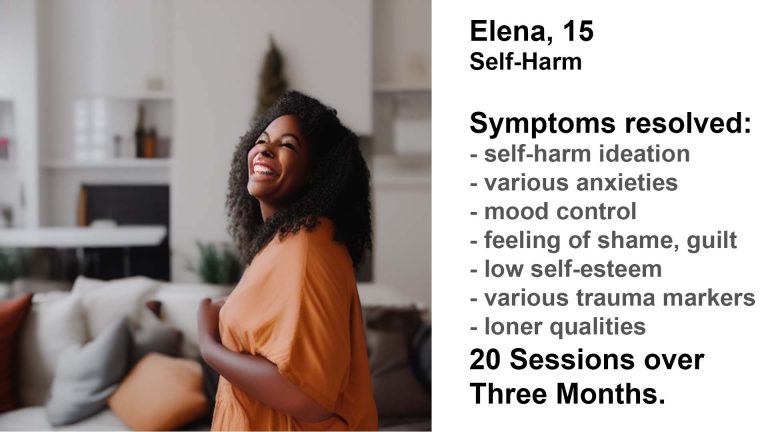Case Study: Elena, 15, Self-Harm

Self-Harm Ideation, Trauma and Low Self-Esteem Resolved in Twenty Neurofeedback Sessions (3 Months)
Before
– self-harm ideation
– various anxieties, including social, “what’s next”
– mood control issues
– feeling of shame, guilt
– low self-esteem
– various trauma markers
– loner qualities
Twenty Sessions, over 3 Months
After
– friendships with people in class abover her, acceptance
– self-harm tendencies abated
– positive outlook, more extroverted
– new courage and motivation
– vision for studies beyond school
– more assertive, in particular with overbearing mother
– trauma markers resolved
Elena's Full Story:
Elena had already changed school multiple times due to bullying. She was exceptionally smart, and creative, and found it hard to be accepted by different playgroups during her early teens. Home schooling during the last years further reduced her social circle, and after returning to school for a year, her best friend was hospitalised following a suicide attempt.
Meanwhile, she was having difficulties with body awareness and began questioning her gender identity. Having voiced urges to self-harm, she began ‘cutting’ after a family vacaction she had long looked forward to turned out to be a disappointment. They had gone on a trip abroad with friends of the parents and their teenage children, who had just finished their GCSE exams (10th grade). While the others were celebrating the end of this intense study period, Elena was ‘encouraged’ (forced) to continue wearing an N95 mask in their presence, as well as in all public places. Her mother discouraged her from mixing with the other teenagers without adult supervision, thus ostracising her physically and emotionally. When Elena returned from vacation, she appeared deeply upset and broken, insisting on wearing her hoodie while training at first. This lasted throughout most of the session and she was loathe to even make small talk. The advantage of neurofeedback training became particularly apparent through this, as we don’t rely on, or even require, any deep conversations and instead work on training subconscious processes. By the end of the session, she was relaxed and confidently pulled back her hood.

Elena’s mother had made the well-intentioned decision to make herself available to her daughter in all forms of support. This proved to be overly invasive for the teenager; it also caused issues with the school and other parents, and consequently with Elena and her acceptance by her classmates. The mother’s intensity, mood swings and hypervigilant obsessions were not of emotional support to Elena, nor to the family in general: Effectively still self-isolating, distrusting Covid-safety of public places and transport, insisting on the constant presence of racial hostility in all situations, and fostering an atmosphere of severe anxiety and hyper-vigilance instead of providing an emotional safe space and teaching the ability to rationally self-soothe. She continued to insist on Elena’s wearing of an N95 mask in all public situations, including at school, which made Elena look physically different, prevented others from seeing her facial expressions, and her from appreciating the effects of non-verbal communications.
We did twenty neurofeedback sessions over the course of three months, during which Elena cast away the cloud under which she had found herself and gained acceptance at school. Her self-harm tendencies quickly abated and were no longer mentioned after a month. Sleep improved, and her more bubbly, extroverted self came out. She made friends with a group of students in a class above her. Elena became more assertive, which led to some friction with her mother who still insisted on being a part of every fibre of her life. At this point, or before, it would have helped for the mother to have done neurofeedback training herself; this way, we were working against substantial adversity in her immediate environment. Instead, Elena was left to carve out personal space by herself, which she managed with a mix of rational argumentation and some emotional confrontations. Her father was encouraged by this; he had been effectively relegated into a submissive side-role by her overbearing mother, and found new encouragement as Elena’s resolve strengthened. This helped change some entrenched family dynamics and introduced a new optimism, consolidating her relationship with her dad who became a more pivotal go-to person in her life.
Elena enjoyed watching movies, which were part of her curriculum in a film studies class. Her requests were well-researched, and she was quick to point out when a film was not capturing her full attention and needed changing.